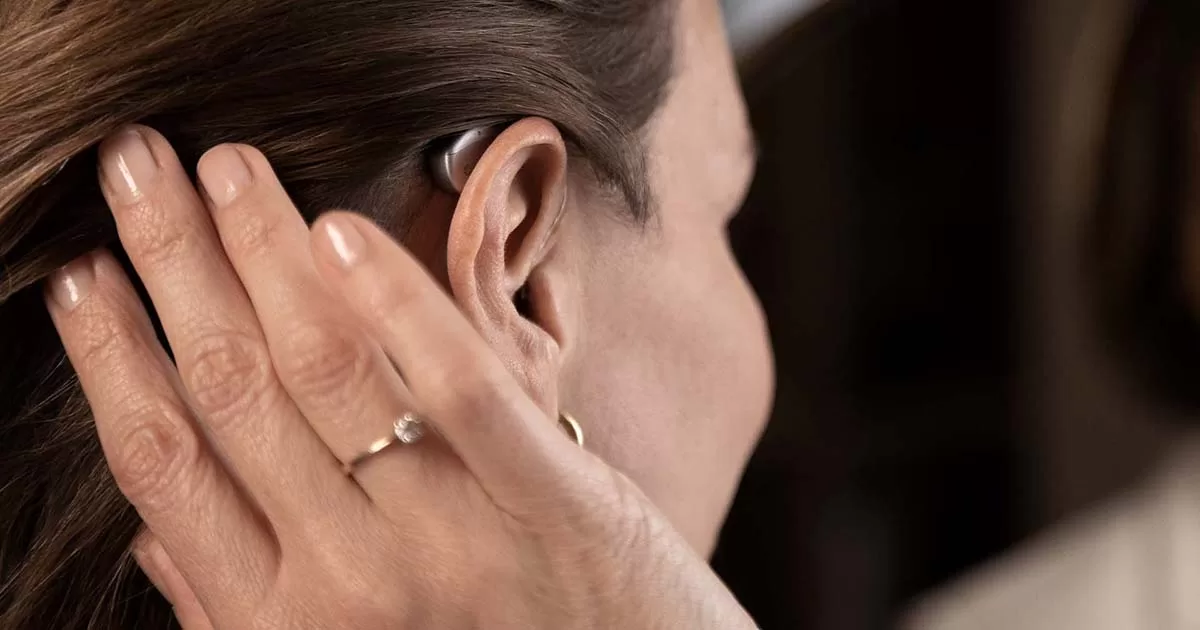Our sense of hearing helps us to socialize, learn new things, and communicate. Imagine if you couldn’t hear suddenly? It can be debilitating, and you may feel left out. That is how some people experience their daily lives with a condition of hearing loss.
Hearing loss is a very common condition that affects 1 in 6 Australians and millions of others across the globe. Its affects can range from mild to severe and may be either temporary or permanent.
Some common signs of hearing loss include turning up the volume when listening to the TV, asking others to repeat their speech during a conversation, and experiencing ringing or buzzing in your ears.
Not all hearing loss is the same and is typically categorized into 3 main types; conductive, sensorineural and mixed hearing loss. Read on to learn more about the different types of hearing loss and how we can help you.
Content Navigation
Different Types of Hearing Loss:
There are 3 main categories of hearing loss, known as conductive, sensorineural and mixed. Conductive hearing loss is usually referred to as temporary and is due to a physical obstruction restricting sound waves travelling sufficiently through the outer or middle ear. Sensorineural hearing loss is permanent as a result of damage occurring in the inner ear and/or auditory nerve. Mixed hearing loss as the name suggests is a mixture of both Conductive and Sensorineural. Your best option for treating any type of hearing loss is to seek treatment as early as possible and have regular hearing assessments to assess your auditory health.
Sensorineural Hearing Loss
Sensorineural hearing loss is the most common type of hearing loss. This form of auditory impairment is permanent. It impacts the pathways from your inner ear to your brain. This occurs when the inner ear structures are damaged, such as the auditory nerves or the hair cells (known as stereocilia) which are located in the cochlea. The function of the inner ear is to convert the sound waves into electrical signals, which are then transferred to the brain for processing.
Symptoms of Sensorineural Hearing Loss
- Difficulty understanding certain voices, such as children’s and/or female voices.
- Trouble hearing speech or sounds when background noise is present.
- People sound like they are constantly mumbling when talking to you.
- Unable to hear certain sounds, such as clock ticking or alarms.
- The need to turn the TV or radio up louder than other people.
- You have difficulty understanding speech clearly in groups of people or meetings.
- Buzzing or ringing sounds in your ears (commonly known as tinnitus).
Common Causes of Sensorineural Hearing Loss
Sensorineural hearing loss can result from a number of different reasons but the two most common causes are Age-Related hearing loss (known as Presbycusis), which occurs through the natural aging process, and Noise-Induced hearing loss typically caused by prolonged exposure to loud noise either through work or recreational activities.
Although sensorineural hearing loss typically occurs in the later stages of life there are also many people who are affected from an early age and even from birth. This type of hearing loss is typically due to genetic conditions or as a result of infections passed from the mother to the foetus inside the womb (Rubella, herpes, toxoplasmosis).
The most common causes are:
- Aging (Presbycusis)
- Long-term exposure to loud noises
- Head trauma or injury that damages delicate structures of the inner ear
Less common causes are:
- Meniere’s disease
- Illness
- Heredity
- Tumours (acoustic neuroma)
- Infections or viruses
- Side effects of medications
Learn More: Causes Of Hearing Loss: Everything You Need To Know
Treatment Options for Sensorineural Hearing Loss
Unfortunately, there is no current medical or surgical procedure that can repair the hair-like sensory cells that become damaged in the inner ear. But there are a number of devices available that can help improve hearing depending on the severity and type of hearing loss:
- Hearing aid(s)
- Cochlear implants
- Bone-Anchored hearing aid (BAHA)
- Hybrid cochlear implants
- Assistive Listening Devices
Conductive Hearing Loss
Conductive hearing loss occurs in the outer and/or middle ear. An obstruction or damage in this area restricts the sound waves from travelling to the inner ear. Soft sounds can be hard to hear, while loud sounds are muffled. This type of hearing loss is typically temporary, as when the obstruction causing the restriction of sound is treated, its function will resume to normal.
A build-up of earwax or fluid in the middle ear is a common cause of conductive hearing loss. This type is usually temporary and easily treated, although if an infection is left untreated, it can sometimes become permanent if damage has occurred to the eardrum.
Symptoms of Conductive Hearing Loss
- Experiencing muffled hearing (often caused by fluid in the ears).
- Dizziness
- Hearing your own voice differently (echo, drummy)
- A foul odour coming from the ear canal.
- Tenderness or ear pain.
- Ear drainage
- Decreased ability to hear.
- Sudden loss of hearing.
- Fullness or blocked sensation in your ears.
Common Causes of Conductive Hearing Loss
This type of auditory impairment can be caused by the following:
- Excessive build-up of earwax
- Perforated eardrums
- Otitis externa (infection of the external ear)
- Otitis media (infection in the middle ear)
- Otosclerosis (abnormal bone growth in the ear)
- Tympanosclerosis
- A foreign object stuck in the ear canal.
- A benign tumour (Cholesteatoma)
Treatment Options for Conductive Hearing Loss
Medical treatment usually restores conductive hearing loss, but it may become permanent if the damage medical treatment isn’t sought.
- Ototopical drops (used to treat infections in the outer ear)
- Antibiotic tablets (used to treat middle ear infections)
- Cerumen Drops (used to soften and remove excessive earwax)
- Hearing aid (If the conductive loss is unrepairable)
- Bone-anchored implant (If the conductive loss is unrepairable and the use of a traditional hearing aid is not suitable)
Learn More: Hearing Loss: Causes, Diagnosis and Treatment
Mixed Hearing Loss
A Mixed hearing loss occurs when conductive and sensorineural hearing loss are both present. The sensorineural impairment is typically permanent, while the conductive hearing component is typically temporary. For example, mixed hearing loss may occur in people with Presbycusis who also have an ear infection.
Symptoms of Mixed Hearing Loss
The symptoms of mixed hearing loss can be a combination of sensorineural and conductive symptoms. It can reduce hearing in either one ear (unilateral hearing loss) or both (bilateral hearing loss) and is typically identifiable by an increased difficulty listening to speech or sound in the affected ear (s).
Common Causes of Mixed Hearing Loss
Causes of mixed hearing loss will be a mixture of both the conductive and sensorineural caused previously discussed.
- Head trauma (Sensorineural or Conductive)
- Age-related hearing loss (Sensorineural)
- Earwax impaction (Conductive)
- Gene factors (Sensorineural or Conductive)
- Certain medications (Sensorineural or Conductive)
- Infection in the outer or middle ear (Conductive)
- Frequent exposure to loud noises (Sensorineural)
Treatment Options for Mixed Hearing Loss
People experiencing mixed hearing loss need to have the cause of their condition assessed by a hearing care professional to best determine the right course of action. The first step would be to address the conductive component of the loss with wither surgical procedures and other medical treatments depending on the cause. Once the conductive component is addressed, then we can look at the sensorineural aspect and determine the best cause of rehab for the individual, either with the use of hearing aids, cochlear implants, bone-anchored hearing aids, or assistive listening devices.
Final Thoughts:
As we have discussed, there are 3 main types of hearing loss which can occur from a range of different causes and conditions. In order to identify and seek adequate treatment for your specific type of loss, a hearing assessment is required by an experienced hearing care professional.
It is important to be advised that if you notice a sudden hearing loss, your best option is to seek treatment immediately.
Many patients that undergo a hearing test are often surprised to find that they have some level of hearing loss when tested. Hearing loss is not always noticeable and generally occurs gradually over a period of time. Some frequencies can remain within the normal range while others significantly decline. Annual hearing checks are recommended in order to monitor the decline in hearing year on year and should be incorporated into your annual health checklist.
Independent Hearing specializes in hearing loss prevention, detection and rehabilitation. We offer FREE consultations and are fully accredited with the government’s office of hearing service program to provide subsidized services to pension and DVA cardholders. Contact us today on 08 8004 0077!














